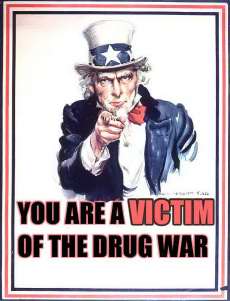South Carolina reform organization closes shop
By Skip Johnson
President of South Carolinians for Drug Law Reform
Norm Stamper, retired chief of police in Seattle, says America’s so-called war on drugs “has arguably been the single most devastating, dysfunctional social policy since slavery.” His words are being heard. All over America – the main exceptions being South Carolina and other Southeastern states – people are making concrete progress in changing that policy. For example:
Twelve states have enacted medical marijuana bills; California alone has more than 1,000 shops selling marijuana today to sick and dying people who have prescriptions from their doctors.
Delaware, New Jersey and D.C., among others, have new needle exchange programs in operation that are cutting back on the spread of AIDS, Hepatitis-C and other wasting diseases. Needle exchanges, illegal in most states, are also protecting police officers and medical personnel from being accidentally stuck.
Local governments in Colorado and several other states have ordered their police departments to put marijuana arrests on the bottom of their list of priorities, thus freeing up police to go after real criminals and easing pressure on the courts and prisons.
Nationally, only recently did the U.S. Sentencing Commission toss out guidelines that dictated penalties involving crack cocaine be 100 times harsher than penalties involving powdered cocaine, realizing that the two are just two versions of the same thing. (As is true with most drug laws, the crack/powder discrepancy was a racist thing: White people prefer powdered cocaine; blacks prefer crack. So black people were getting punished 100 times harsher than white people for the doing the same thing.) The commission found the difference so abhorrent that it made its decision retroactive, meaning some 19,500 inmates, most of them black, can seek reductions in their sentences.
In each case change came only after grassroots efforts forced it. In South Carolina, however, because too few people are willing to work for change, South Carolinians for Drug Law Reform is folding.
I’m sad about that because we are the only organization in South Carolina that is devoted exclusively to reforming our cruel, racist, counterproductive drug laws.
But I am especially sad because we have not been able to make inroads into the black community. After all, the “war on drugs” is actually a war on people of color, especially black people. (Doubt that? Look at one set of statistics: Black people make up about 12-13 percent of the nation’s population, but they represent approximately 25 percent of all drug-related arrests, 50 percent of all convictions, and 75 percent of all incarcerations. Racism is the only reason for that. How does that matter? More than 20,000 black people in Florida were disenfranchised from voting in the 2004 General Election because they had drug-related convictions, most of them for possession or distribution of marijuana. Had those 20,000 nonviolent people been allowed to vote, George Bush certainly would have lost Florida and with it the presidency, and what a different world we would be living in today.)
Even though SCDLR is shutting down, it’s good to know we have made at least some difference in South Carolina. We’ve changed the minds of at least a few people, and we‚ve raised questions in the minds of others. Our testimony before state Senate subcommittees hopefully had some impact in stopping some very bad bills from becoming law, such as the one that would have denied South Carolina lottery scholarships to anyone with a drug arrest on his/her record. And I like to believe our efforts to counterbalance the federal drug czar’s drive to set up random drug testing programs in Charleston-area schools played a part in keeping that idea at bay. At the very least, we’ve made a lot of people aware there is another side to the issue.
But just because SCDLR is folding does not mean the fight is over. The fight is far from over. Those who understand the immediate, urgent importance of Chief Stamper’s words – that the drug war is arguably “the single most devastating, dysfunctional social policy since slavery” – cannot help but keep on charging windmills until the windmills fall.
Sooner or later people will grow to see that drug prohibition is the cause of, certainly not the solution to, almost all drug crime in America. Exactly like alcohol prohibition created the opportunity for the likes of Al Capone early last century, drug prohibition has done the exact same thing in our day — except the consequences of drug prohibition are almost unthinkably more severe than those of alcohol Prohibition. Some day the light will dawn in South Carolina, but obviously that day is not today.
So to all of you who served as officers or board members, attended our meetings, signed our medical marijuana petition, spoke truth to power, contributed to our website (especially Todd, the webmaster), or helped in any other way to raise awareness of the issue, you have my heartfelt thanks. We’ve lost the battle but not the war. The issue remains.


I’m writing my dissertation about the drug laws and their impact on women who have entered substance abuse treatment over the past ten years in SC. I just wanted to say that there are a lot of us here in SC who hate the SC drug laws and have included them in our fights for justice.
I just have to say that I am in the middle of researching this and have come to find that the National Drug Policy is a joke and a gigantic cover up to funnel money into alot of law enforcement people’s pockets. I was a Prisoner of this so-called War on Drugs….and am going to write a book about the facts of being a Federal Prisoner. I was given 33 Months for 1.9 grams of Meth. I feel that this is a national tragedy and something needs to be done about it.